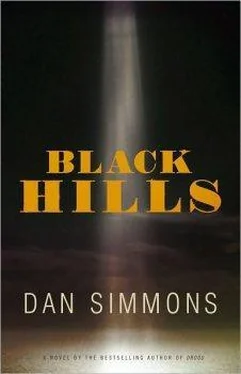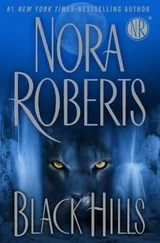Sitting Bull performs this holiest of holies—this wiwanyag wachipi Sun Dance—for the Ikče Wičas´a , the Natural Free Human Beings.
That first day and evening at the Deer Medicine Rocks, Limps-a-Lot points out to the excited but nervous Paha Sapa the various great Ikče Wičas´a whom his tunkašila wičasa wakan wants the boy to know by sight and possibly to meet, but not to touch unless one of the men specifically asks for such contact.
As young as he is, Paha Sapa understands that his tunkašila wants these famous men to know of his small-vision-backward-or-forward-touching , but not for him to use the seeing ability—even if he were able to do so at will, which he usually is not—unless asked to do so. Paha Sapa bows his head in understanding.
All that day the famous men and their followers ride in from different directions. All the bands of the Lakota are present. From the Oglala come Big Road and Limps-a-Lot’s first wife’s famous cousin, Crazy Horse. From the Hunkpapa there are Gall and Crow and Black Moon and Sitting Bull himself. From the Sans Arcs has come Spotted Eagle. From the Minneconjou arrives Fast Bull and the younger Hump. Dull Knife has come up with the few Shyelas allowed to attend. (The other famous Cheyenne leader, Ice Bear, has chosen to stay at the larger village to the south.)
When Limps-a-Lot tells Paha Sapa each of the great arrivals’ names, the older man cries out—
— Hetchetu aloh!
It is so indeed.
More than a thousand Lakota have already gathered. Paha Sapa thinks that this is the most magnificent assembly he has ever seen, grander even than the great gatherings at Matho Paha —Bear Butte—every second summer, but Limps-a-Lot tells him that this temporary village is only for Sitting Bull’s Sun Dance and that even more Lakota and Cheyenne will continue to gather during the ceremony, the nights of the full moon, and the days beyond.
Paha Sapa watches the preparations for Sitting Bull’s wiwanyag wachipi with a young boy’s awe, but also with the strange sense of detachment that comes over him at such times. It is as if there are several Paha Sapas watching through his eyes, including a much older version of himself looking back through time while coexisting in the thin boy’s mind.
First, an honored Hunkpapa wičasa wakan —but not Paha Sapa’s beloved tunkašila —is sent out alone to select the waga chun , the “rustling tree” or cottonwood, that will stand in the center of the dancing circle.
When this wičasa wakan , an old boyhood friend of Limps-a-Lot named Calling Duck, returns with the news that he has found the right tree, many of the hundreds gathered bedeck themselves with flowers picked along the banks of the river. Several warriors chosen for their bravery then count coup on the tree, with the bravest warrior—this year a young Oglala follower of Crazy Horse named Kills Six Alone—being the last and loudest to strike the tree. Paha Sapa learns that Kills Six Alone will now hold a Big Giveaway in which he will give away almost everything he owns—including his two young wives only recently earned in battle—to the other men at the Sun Dance.
After the counting coup on the tall, proud (but not too tall or thick or old) waga chun standing alone in its high-grass meadow, several virgins with axes approach the tree while chanting a song saying that if anyone knows they are not virgins or that they are not virtuous in all ways, that man or woman must speak now or forever be silent. Then, when no one speaks, the virgins proceed to chop down the tree.
Limps-a-Lot leads Paha Sapa to the cluster of warriors and then boys and old men gathered to catch the tree as it falls; it must not, he explains, touch the ground. Six of the chiefs who were sons of chiefs then carry the sacred tree back to the site where the wiwanyag wachipi will be held.
Before the waga chun is stripped of its branches and erected, Limps-a-Lot leads Paha Sapa out of the grassy circle of the dancing place, and the boy (and the older man within him) watches while scores of warriors on horses gather around the periphery of this holy place. At a signal given by Sitting Bull, the young men rush to the sacred place at the center of the circle where the tree will stand, all of them pushing and shoving and fighting and gouging to be the first to touch that bit of soil. Amid the cloud of dust and flurry of hooves and rearing of horses and shouts from both warriors and their watchers, Paha Sapa smiles. It looks like nothing more than a grown-up version of his own boy-game of Throwing-Them-Off-Their-Horses. But before the boy makes the mistake of laughing aloud, Limps-a-Lot touches his shoulder and whispers in his ear that this is very important, since the man who is first to touch the sacred place will not be killed in battle this year.
That evening they have a wonderful cookout closer to the river than to the Deer Medicine Rocks, and a very hungry Paha Sapa has his fill of buffalo meat and his favorite delicacy, boiled dog. The bands have sacrificed several puppies for this feast, so there is enough to go around. Then the warriors strip the chosen tree of its lower limbs and paint it blue, green, yellow, and red. Paha Sapa’s tunkašila explains that each color signifies a direction—north, east, west, and south—and then a large willow sweat lodge and sun shelter is built near the center of this consecrated hoop, and the real prayers begin. A wičasa wakan takes tobacco and fills a pipe—in this case a unique Ptehinčala Huhu Canunpa , a most sacred Buffalo Calf Bone Pipe that has been in the Lakota nation for twelve generations—and reconsecrates the site and the tree and the event not only to the four directions of the flat, visible earth, but also to the sky and to Grandmother Earth herself, as well as to all of the earth’s visible and invisible fliers and four-leggeds, asking each in turn to make this ceremony correct in each way so as to please them and to please Wakan Tanka, the All, the Great Mystery, the Father, the Grandfather of All Grandfathers.
Then the assembled men do what they have to do to turn the tree into a medicine lodge.
They raise the tall, thin waga chun to much deep chanting by the men and constant tremolo from the women.
They mark a circle around it with twenty-eight forked posts. From each of these posts they run a long pole to be bound up in the sacred tree, leaving only a special opening in the east by which the rising sun may enter.
Now, as everyone gathers around the tree-turned-medicine-lodge in the lengthening summer twilight, only women visibly pregnant are allowed to approach the waga chun and to dance around it. Paha Sapa understands that the All, Wakan Tanka , as well as the specific wakan of the Sun, loves fruitfulness, thus the pregnant women, as much as the spirit of the Sun loves dancing.
Paha Sapa looks east across the prairie—its grasses rustling now to the rising evening wind like ripples in the fur of a living beast—and sees the full moon rising. Limps-a-Lot has explained that such an important wiwanyag wachipi is always held during the Moon of Making Fat or the Moon of Blackening Cherries when the moon is full, banishing the ignorance of the black sky and making the summer night most like the radiant days so beloved by the spirit of the Sun.
Paha Sapa sleeps well that night. This night is so warm that he and his grandfather do not even raise a shelter of willow branches, but sleep in the open on the blankets and skins they have brought. Only once does Paha Sapa awaken, and that is because the full moon is shining too brightly in his face. He grunts and rolls over closer to his uncle-grandfather and goes back to sleep.
Читать дальше












